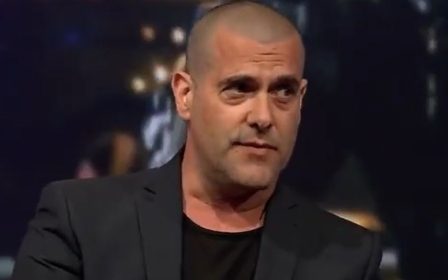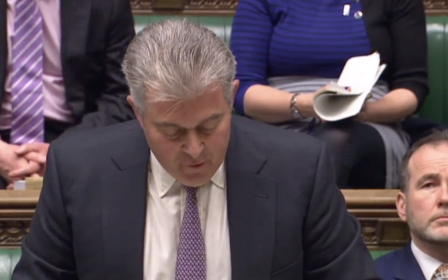UK Prevent review faces fresh criticism over Shawcross appointment

The UK government on Tuesday named the former head of the Charity Commission, William Shawcross, to lead its long delayed independent review of Prevent in a move that is likely to further enrage critics of the contentious counter-terrorism strategy.
Shawcross's appointment comes after the government was forced to drop its initial choice for the role, Lord Carlile, in December 2019 after his appointment was the subject of a court challenge over his past advocacy for Prevent.
In February last year, the Home Office said it was committed to appointing a reviewer through an open and transparent process after human rights campaigners threatened it with further legal action.
However, the future of the review, which the government first committed to two years ago, has been uncertain ever since. In May the government pushed back a legal deadline for its completion from August last year until August 2021.
Shawcross's appointment is unlikely to be welcomed by campaigners who have raised concerns that Prevent is discriminatory against Muslims and who say that a fully independent review must consider whether the strategy ought to be scrapped altogether.
New MEE newsletter: Jerusalem Dispatch
Sign up to get the latest insights and analysis on Israel-Palestine, alongside Turkey Unpacked and other MEE newsletters
What is the Prevent Strategy?
+ Show - HidePrevent is a programme within the British government's counter-terrorism strategy that aims to “safeguard and support those vulnerable to radicalisation, to stop them from becoming terrorists or supporting terrorism”.
It was publicly launched in the aftermath of the 2005 London bombings and was initially targeted squarely at Muslim communities, prompting continuing complaints of discrimination and concerns that the programme was being used to collect intelligence.
In 2011, Prevent's remit was expanded to cover all forms of extremism, defined by the government as “vocal or active opposition to fundamental British values, including democracy, the rule of law, individual liberty and mutual respect and tolerance of different faiths and beliefs.”
In 2015, the government introduced the Prevent Duty which requires public sector workers including doctors, teachers and even nursery staff to have “due regard to the need to prevent people being drawn into terrorism”.
A key element of Prevent is Channel, a programme that offers mentoring and support to people assessed to be at risk of becoming terrorists. Prevent referrals of some young children have proved contentious. 114 children under the age of 15 received Channel support in 2017/18.
Criticism of the Prevent Duty includes that it has had a “chilling effect” on free speech in classrooms and universities, and that it has turned public sector workers into informers who are expected to monitor pupils and patients for “signs of radicalisation”. Some critics have said that it may even be counter-productive.
Advocates argue that it is a form of safeguarding that has been effective in identifying and helping troubled individuals. They point to a growing number of far-right referrals as evidence that it is not discriminatory against Muslims.
In January 2019 the government bowed to pressure and announced that it would commission an independent review of Prevent. This was supposed to be completed by August 2020. After being forced to drop its first appointed reviewer, Lord Carlile, over his past advocacy for Prevent, it conceded that the review would be delayed.
In January 2021 it named William Shawcross as reviewer. Shawcross's appointment was also contentious and prompted many organisations to boycott the review. Further delays followed. Shawcross's review, calling for a renewed focus within Prevent on "the Islamist threat", was finally published in February 2023 - and immediately denounced by critics.
Shawcross is a former trustee and director member of the Henry Jackson Society, a controversial neoconservative think-tank that has been accused of stoking Islamophobia. He is currently a senior fellow at the right-wing Policy Exchange think tank.
During his tenure as head of the Charity Commission from 2012 to 2018 the regulator was accused of unfairly targeting Muslim charities during a period when many organisations were involved in sending aid to rebel-held areas of Syria. The commission denied targeting Muslims or any other religion or type of charity.
Commenting on the appointment on Twitter, Miqdaad Versi, a spokesperson for the Muslim Council of Britain, drew attention to comments attributed to Shawcross in 2012 when he has been quoted as saying: "Islam is one of the greatest, most terrifying problems of our future. I think all European countries have vastly, very quickly growing Islamic populations".
Versi said the MCB, an umbrella group representing about 500 Muslim organisations, had initially welcomed the government's commitment to a review of Prevent and had faced criticism for doing so.
"They were roundly criticised by many for implicitly trusting that this would be done fairly. It seems the critics were right," he said.
In a statement, the MCB said: "Once again, the government is making it clear it has no interest in truly reviewing the policy. William Shawcross is singularly unfit to be a neutral and fair assessor of this government policy, which has been criticised for unfairly targeting British Muslims, given his frightening views about Islam and Muslims.
"The appointment of William Shawcross gives further evidence that this Government wants to troll Muslims and sweep widespread concerns about Prevent under the carpet.
Baroness Warsi, a former Conservative Party chair and longstanding critic of Prevent, said: "Inappropriate appointment that will further toxify a policy which is at best a broken brand at worst has a dubious record of implementation. Another example of the government's dangerously ideological, divisive and flawed understanding of the issues around countering extremism."
Sarah St Vincent, the executive director of Rights and Security International (RSI), a rights group which brought the legal action which led to Lord Carlile being dropped, told Middle East Eye that Shawcross's appointment raised fresh concerns about the independence of the review.
"The government had a vast field of potential candidates to choose from. Choosing someone who hasn't been accused of Islamophobic comments is a pretty low bar," said St Vincent.
"We would like to know how many candidates applied, whether the government considered the controversy surrounding Shawcross, how does it expect Muslim communities to respond and what is its response to those concerns."
In September, James Brokenshire, the security minister, said there had been 35 applicants for the role. Responding to questions about criticism of Shawcross's appointment on Wednesday, a Home Office spokesperson said: "A panel, led by an independent chair, assessed the candidates and found that Mr Shawcross met the criteria and possessed the right range of skills and experience to conduct this important review.”
The appointment was also condemned by Cage, a human rights group focused on the impact of counter-terrorism policies on Muslim communities.
"We objected to the 'review' and insisted on our principled call to end Prevent, because there is no way to reform a fundamentally racist and Islamophobic policy," said Muhammad Rabbani, Cage's managing director.
"The appointment of Shawcross, following the shameless appointment of Lord Carlile previously, should lead all civil society actors to echo our call for ending Prevent and to robustly boycott this sham of a review."
In comments announcing the appointment on Tuesday, both Baroness Williams, a Home Office minister, and Shawcross appeared to suggest that the scope of the review would not include considering the possibility that Prevent could be scrapped.
"It is important that this vital programme continues to improve and I look forward to seeing Mr Shawcross’ recommendations in due course," said Williams.
Shawcross added: "I intend to lead a robust and evidence-based examination of the programme, to help ensure that Britain has a clear and effective strategy to protect vulnerable people from being drawn into terrorism."
Priti Patel, the home secretary, said: "Following an open competition to appoint a new independent reviewer of Prevent, I am appointing William Shawcross. Mr Shawcross brings with him the necessary skills, experience and independence to carry out this review and provide recommendations to further develop our approach to supporting people vulnerable to being drawn into terrorism in the future."
Patel said the terms of reference for the review would be published shortly.
Shawcross is the latest in a recent series of contentious public appointments made by the government.
It follows the appointments of Baroness Falkner, who has hosted parliamentary events for the Henry Jackson Society, as head of the Equalities and Human Rights Commission (EHRC), and David Goodhart, who has defended the Home Office's "hostile environment" policy, as an EHRC commissioner.
Middle East Eye delivers independent and unrivalled coverage and analysis of the Middle East, North Africa and beyond. To learn more about republishing this content and the associated fees, please fill out this form. More about MEE can be found here.




